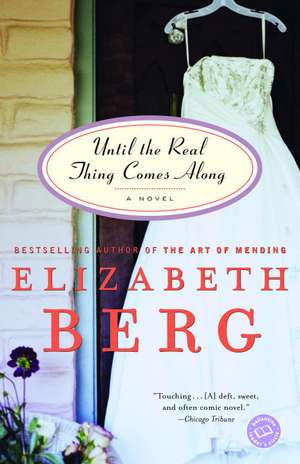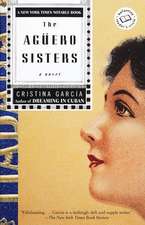Until the Real Thing Comes Along
Autor Elizabeth Bergen Limba Engleză Paperback – 31 mai 2000
Against her better judgment, and pleas from family and friends, Patty refuses to give up on Ethan. Every man she dates ultimately leaves her aching for the gentle comfort and intimacy she shares with him. But even as she throws eligible bachelors to the wayside to spend yet another platonic night with Ethan, Patty longs more and more for the consolation of loving and being loved. In the meantime she must content herself with waiting--until the real thing comes along. . . .
Preț: 120.40 lei
Nou
Puncte Express: 181
Preț estimativ în valută:
23.04€ • 24.18$ • 19.12£
23.04€ • 24.18$ • 19.12£
Carte disponibilă
Livrare economică 20 martie-03 aprilie
Preluare comenzi: 021 569.72.76
Specificații
ISBN-13: 9780345437396
ISBN-10: 034543739X
Pagini: 272
Dimensiuni: 132 x 204 x 15 mm
Greutate: 0.2 kg
Ediția:Ballantine Bks.
Editura: BALLANTINE BOOKS
ISBN-10: 034543739X
Pagini: 272
Dimensiuni: 132 x 204 x 15 mm
Greutate: 0.2 kg
Ediția:Ballantine Bks.
Editura: BALLANTINE BOOKS
Notă biografică
Elizabeth Berg’s novels Open House, The Pull of the Moon, Range of Motion, What We Keep, Never Change, and Until the Real Thing Comes Along were bestsellers. Durable Goods and Joy School were selected as ALA Best Books of the Year. Talk Before Sleep was an ABBY finalist and a New York Times bestseller. In 1997, Berg won the NEBA Award in fiction, and in 2000 her novel Open House was named an Oprah’s Book Club selection. She lives in Chicago.
Extras
I used to think that the best thing to do when you had the blues was to soak in a bathtub full of hot water, submerge yourself so that only the top half of your head was in the outer world. You could feel altered and protected. Weightless. You could feel mysterious, like a crocodile, who is bound up with the wisdom of the natural world and does not concern herself with the number of dates she has per month or the biological time clock. You could feel purified by the rising steam. Best of all, you could press a washrag across your chest, and it would feel like the hand of your mother when you were little and suffering from a cold, and she'd lay her flat palm on you to draw the sickness out.
The problem with the bathtub method is that you have to keep fooling with the faucet to keep the water temperature right, and that breaks the healing spell. Besides that, as soon as you get out of the tub the solace disappears as quickly as the water, and you are left with only your annoying lobster self, staring blankly into the mirror.
These days I believe that museums are the place to go to lose your sorrow. Fine-art museums with high ceilings and severe little boxes mounted on the wall to measure the level of humidity; rooms of furniture displayed so truly the people seem to have just stepped out for a minute; glass cases full of ancient pottery in the muted colors of old earth. There are mummies, wearing the ultimate in long-lasting eyeliner; old canvases that were held between the hands of Vermeer; new canvases with emphatic smears of paint. The cafés have pastry as artful as anything else in the building; gift shops are stocked with jewelry modeled after the kind worn by Renaissance women--the garnet-and-drop-pearl variety. I buy that kind of jewelry, in love with its romantic history and the sight of it against the black velvet. Then I bring it home and never wear it because it looks stupid with everything I have. But it is good to own anyway, for the pleasure of laying it on the bedspread and then sitting beside it, touching it.
What I like most about museums is that the efforts of so many people remain so long after they are gone. They made their marks. If you are an artist, you can hope to achieve that. If you are not an artist, you believe that having children is the closest you'll come.
Well, that's what I believe. And anyway, I have always preferred the company of children; I just like to be around them. Whenever my large family gets together on holidays, I sit at the kids' card table. It's so much more relaxing, what with the way the dishes are plastic, and manners of any kind optional. So much more interesting, too--no talk about current events, no holding forth by any overweight, overeducated aunt or uncle. There is talk only about things that are astonishing. Facts about the red ant, say, or the elaborate retelling of an unfortunate incident, such as the one where a kid vomited on the teacher's desk.
I always thought I'd have five or six children, and I have imagined so many lovely domestic scenes featuring me and my offspring. Here we are outside on a hot summer day, running through the sprinkler. The children wear bright fluorescent bathing suits in pink and green and yellow; I wear cutoffs and a T-shirt. There is fruit salad in the refrigerator. Later, I will let the older kids squirt whipped cream for the younger ones; then, if they pester me enough in the right way, I'll let them squirt it into their mouths--and mine.
Or here I am at the grocery store, my married hands unloading graham crackers and packages of American cheese that have already been broken into due to the eager appetite of the toddler in the carriage, who is dressed in tiny OshKosh overalls over a striped shirt. His fine hair, infused with gold and red, curls up slightly at the back of his neck. His swinging feet are chubby and bare; he has flung his sneakers and socks on top of the family-size pack of chicken breasts. His brothers and sisters are in school. Later in the afternoon, he will stand at the living-room window, watching for them to come home, squealing and bending his knees in a little joy dance when he sees them marching down the sidewalk toward him, swinging their lunch boxes in high, bright-colored arcs.
I have imagined myself making dinner while my dark-haired daughter sits at the kitchen table. She is making me a picture of a house with window boxes, choosing crayons with slow care. She is wearing yellow turtle barrettes in her hair, and a bracelet she made from string. "Hey, Mommy," she says, "do you want flowers on the ground, too?" Oh yes, I say. Sure. "Me too," she says. We smile.
I have imagined a fleshy constellation of small children and me, spread out and napping on my big bed while the newest baby sleeps in her crib. The pulled-down shades lift with the occasional breeze, then slap gently back against the windowsill. If you listen carefully, you can hear the small breathing sounds of the children, their soothing, syncopated rhythms. There is no other sound, not even from the birds; the afternoon is holding its finger to its lips. All the children have blankets and all of them are sucking their thumbs. All of them are read to every night after their baths. All of them think they are the favorite. None of them has ever had an illness of any kind, or ever will. (I mean, as long as I'm imagining.)
The problem with the bathtub method is that you have to keep fooling with the faucet to keep the water temperature right, and that breaks the healing spell. Besides that, as soon as you get out of the tub the solace disappears as quickly as the water, and you are left with only your annoying lobster self, staring blankly into the mirror.
These days I believe that museums are the place to go to lose your sorrow. Fine-art museums with high ceilings and severe little boxes mounted on the wall to measure the level of humidity; rooms of furniture displayed so truly the people seem to have just stepped out for a minute; glass cases full of ancient pottery in the muted colors of old earth. There are mummies, wearing the ultimate in long-lasting eyeliner; old canvases that were held between the hands of Vermeer; new canvases with emphatic smears of paint. The cafés have pastry as artful as anything else in the building; gift shops are stocked with jewelry modeled after the kind worn by Renaissance women--the garnet-and-drop-pearl variety. I buy that kind of jewelry, in love with its romantic history and the sight of it against the black velvet. Then I bring it home and never wear it because it looks stupid with everything I have. But it is good to own anyway, for the pleasure of laying it on the bedspread and then sitting beside it, touching it.
What I like most about museums is that the efforts of so many people remain so long after they are gone. They made their marks. If you are an artist, you can hope to achieve that. If you are not an artist, you believe that having children is the closest you'll come.
Well, that's what I believe. And anyway, I have always preferred the company of children; I just like to be around them. Whenever my large family gets together on holidays, I sit at the kids' card table. It's so much more relaxing, what with the way the dishes are plastic, and manners of any kind optional. So much more interesting, too--no talk about current events, no holding forth by any overweight, overeducated aunt or uncle. There is talk only about things that are astonishing. Facts about the red ant, say, or the elaborate retelling of an unfortunate incident, such as the one where a kid vomited on the teacher's desk.
I always thought I'd have five or six children, and I have imagined so many lovely domestic scenes featuring me and my offspring. Here we are outside on a hot summer day, running through the sprinkler. The children wear bright fluorescent bathing suits in pink and green and yellow; I wear cutoffs and a T-shirt. There is fruit salad in the refrigerator. Later, I will let the older kids squirt whipped cream for the younger ones; then, if they pester me enough in the right way, I'll let them squirt it into their mouths--and mine.
Or here I am at the grocery store, my married hands unloading graham crackers and packages of American cheese that have already been broken into due to the eager appetite of the toddler in the carriage, who is dressed in tiny OshKosh overalls over a striped shirt. His fine hair, infused with gold and red, curls up slightly at the back of his neck. His swinging feet are chubby and bare; he has flung his sneakers and socks on top of the family-size pack of chicken breasts. His brothers and sisters are in school. Later in the afternoon, he will stand at the living-room window, watching for them to come home, squealing and bending his knees in a little joy dance when he sees them marching down the sidewalk toward him, swinging their lunch boxes in high, bright-colored arcs.
I have imagined myself making dinner while my dark-haired daughter sits at the kitchen table. She is making me a picture of a house with window boxes, choosing crayons with slow care. She is wearing yellow turtle barrettes in her hair, and a bracelet she made from string. "Hey, Mommy," she says, "do you want flowers on the ground, too?" Oh yes, I say. Sure. "Me too," she says. We smile.
I have imagined a fleshy constellation of small children and me, spread out and napping on my big bed while the newest baby sleeps in her crib. The pulled-down shades lift with the occasional breeze, then slap gently back against the windowsill. If you listen carefully, you can hear the small breathing sounds of the children, their soothing, syncopated rhythms. There is no other sound, not even from the birds; the afternoon is holding its finger to its lips. All the children have blankets and all of them are sucking their thumbs. All of them are read to every night after their baths. All of them think they are the favorite. None of them has ever had an illness of any kind, or ever will. (I mean, as long as I'm imagining.)
Recenzii
"Touching . . . [A] deft, sweet, and often comic novel."
--Chicago Tribune
"THIS NOVEL MAKES FOR PLEASANT READING . . . PATTY MURPHY IS APPEALINGLY VULNERABLE. . . . NOVELIST ELIZABETH BERG HAS AN ENGAGING VOICE AND STYLE."
--Los Angeles Times
"A PERCEPTIVE COMEDY OF MODERN MANNERS . . . At the end of each undemanding day, Patty goes home to an empty apartment and listens to her biological clock ticking as ominously as Captain Hook's crocodile. . . . Patty wants a husband and a baby, and not necessarily in that order. . . . But Patty has a problem. Try as she might, there is only one man she can love--her best friend, Ethan--and try as Ethan might, he is quite firmly and intractably gay. With rueful good humor, Until the Real Thing Comes Along shows how Patty and Ethan come to terms with the impossibility of having it all."
--The Boston Globe
"BERG WRITES WITH HUMOR AND UNDERSTANDING ABOUT MATTERS OF THE HEART. . . . The author's generous view of humanity is evident in her characters, who walk right off the page they are so well and truly drawn."
--St. Louis Post Dispatch
"ENTERTAINING . . . FLAWLESS DIALOGUE . . . READING IT IS LIKE EAVESDROPPING ON AN INTIMATE FEMALE CHAT."
--New York Daily News
"COMPELLING . . . [A] WARMLY TOLD TALE."
--People
--Chicago Tribune
"THIS NOVEL MAKES FOR PLEASANT READING . . . PATTY MURPHY IS APPEALINGLY VULNERABLE. . . . NOVELIST ELIZABETH BERG HAS AN ENGAGING VOICE AND STYLE."
--Los Angeles Times
"A PERCEPTIVE COMEDY OF MODERN MANNERS . . . At the end of each undemanding day, Patty goes home to an empty apartment and listens to her biological clock ticking as ominously as Captain Hook's crocodile. . . . Patty wants a husband and a baby, and not necessarily in that order. . . . But Patty has a problem. Try as she might, there is only one man she can love--her best friend, Ethan--and try as Ethan might, he is quite firmly and intractably gay. With rueful good humor, Until the Real Thing Comes Along shows how Patty and Ethan come to terms with the impossibility of having it all."
--The Boston Globe
"BERG WRITES WITH HUMOR AND UNDERSTANDING ABOUT MATTERS OF THE HEART. . . . The author's generous view of humanity is evident in her characters, who walk right off the page they are so well and truly drawn."
--St. Louis Post Dispatch
"ENTERTAINING . . . FLAWLESS DIALOGUE . . . READING IT IS LIKE EAVESDROPPING ON AN INTIMATE FEMALE CHAT."
--New York Daily News
"COMPELLING . . . [A] WARMLY TOLD TALE."
--People
Descriere
Now in paperback comes irresistible women's fiction from the bestselling author of "Talk Before Sleep". Rarely the bridesmaid and never the bride, Patty Hansen sells houses for a living, is desperate to be married and have a child, but is impossibly in love with the wrong man.






